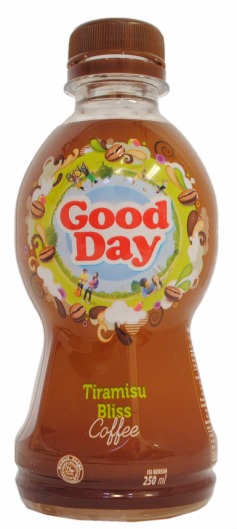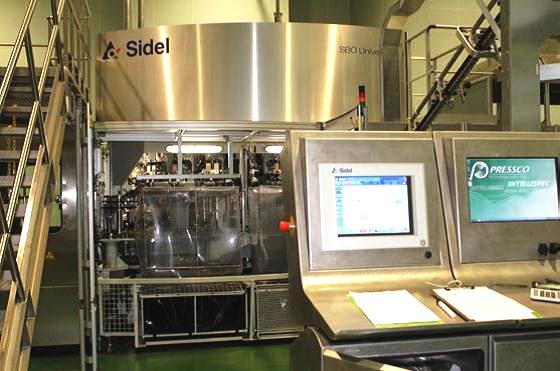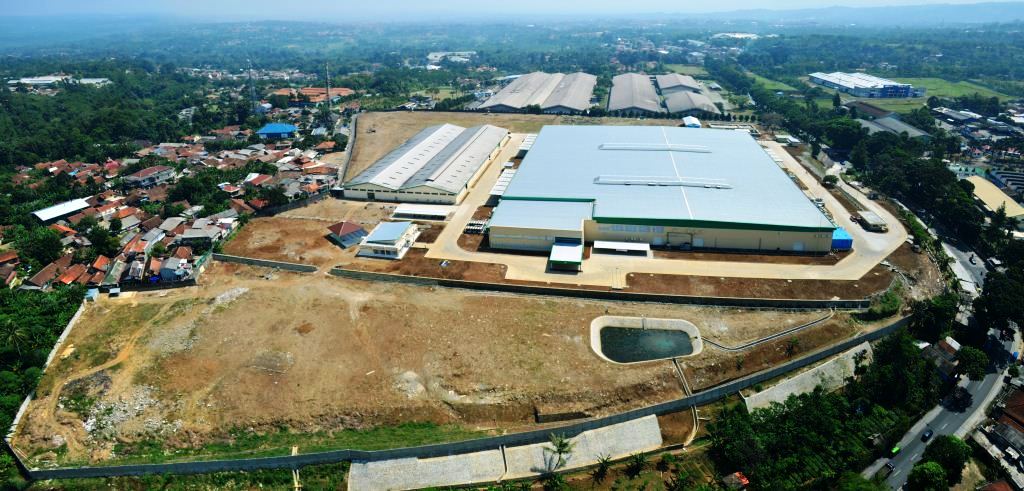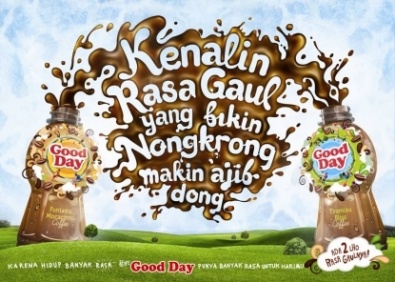20/01/14
Part of the Hokkan HD Group, PT.Hokkan Indonesia wasformed to take advantage of the knowledge gained in asepticproduction by the Group in Japan. The Group was also lookingto enter the beverage market in Indonesia, which is one of thebest-performing emerging countries with a GDP growth in 2011 of6%.
 This continuing growth in the economy, togetherwith an increasing population, has led to a significant jump in theconsumption of beverages in Indonesia over recent years. AsIndonesia's growing "middle-class" with more expendable income islooking for new experiences and tastes, the global trend ofurbanisation - with more people living within the main conurbationsof major cities - is reflected in the country's consumptionpatterns which are expected to continue to grow. Under thesecircumstances, the Hokkan Group entered into partnership for ajoint venture with the Toyota Tsusho Corporation, part of theToyota Group, one of the largest trading companies in Japan, andthe sixth largest in the world. The partners are hoping thejoint operation makes a real impression in the Indonesian PETbottle market, where it is a co-packer - primarily for soft drinks- and contracted aseptic filler. The bottle manufacturingfacility has a potential capacity of five million cases each year -or 150 million individual bottles - and the aseptic process makesit possible to manufacture high quality, lightweight products, witha flexible bottle design and a long product shelf life.
This continuing growth in the economy, togetherwith an increasing population, has led to a significant jump in theconsumption of beverages in Indonesia over recent years. AsIndonesia's growing "middle-class" with more expendable income islooking for new experiences and tastes, the global trend ofurbanisation - with more people living within the main conurbationsof major cities - is reflected in the country's consumptionpatterns which are expected to continue to grow. Under thesecircumstances, the Hokkan Group entered into partnership for ajoint venture with the Toyota Tsusho Corporation, part of theToyota Group, one of the largest trading companies in Japan, andthe sixth largest in the world. The partners are hoping thejoint operation makes a real impression in the Indonesian PETbottle market, where it is a co-packer - primarily for soft drinks- and contracted aseptic filler. The bottle manufacturingfacility has a potential capacity of five million cases each year -or 150 million individual bottles - and the aseptic process makesit possible to manufacture high quality, lightweight products, witha flexible bottle design and a long product shelf life.
Expected switch to healthy beverages
PT.Hokkan Indonesiais now producing a wide range ofnon-carbonated soft drinks, such as coffee-based, tea-based andmilk-based drinks, along with fruit and sports drinks to meet localconsumer demand. Similar to a current trend taking placearound the world, Indonesian consumers are likely to become morehealth-conscious too over the coming years with younger people inparticular already demanding conveniently packaged, healthyproducts. Dairy products, such as drinkable yoghurts, arealready one area that has been positively impacted by the emergingtrend, with single-serve, "on-the-go", rigid plastic formatsperforming particularly well currently. "From our experienceinJapan, we know that aseptic technology can achieve lightweightbottles, a flexible bottle design and long product shelf life. Aseptic technology offers us numerous opportunities formaking quality products," said Masaaki Ikezawa, President ofPT.Hokkan Indonesia.
 Although the purchase ofhealthy beverages, such as sour milk drinks and sports and energydrinks, is not yet common practice amongst other Indonesianconsumers, increasing awareness of health issues, accompanied withrising disposable income, is set to spark a change in habits. PT.HokkanIndonesiaexpects naturally healthy and fortified products,including speciality Asian drinks, bottled water, powderconcentrates, fruit and vegetable juices, functional drinks and RTDteas to grow significantly in sales over the coming years. Packaging formats in the country tend to be 'single-serve' now,with most drinks packaged in PET bottles. Demand forreturnable glass bottles has declined substantially over the lastcouple of years, mainly through one producer switching productionfrom glass to one-way PET bottles. The increasing use of PET isdown to a number of factors: its 100% recyclability,excellent barrier material properties that allow extended shelflife, bottle design freedom and the greater brand recognitionpossibilities offered by the package transparency. Beingre-sealable, light and compact, the PET bottles are also moreconvenient for the customer as they do not have to be consumed atone time and are far more suited to the dynamic urban lifestyles ofyounger Indonesian consumers.
Although the purchase ofhealthy beverages, such as sour milk drinks and sports and energydrinks, is not yet common practice amongst other Indonesianconsumers, increasing awareness of health issues, accompanied withrising disposable income, is set to spark a change in habits. PT.HokkanIndonesiaexpects naturally healthy and fortified products,including speciality Asian drinks, bottled water, powderconcentrates, fruit and vegetable juices, functional drinks and RTDteas to grow significantly in sales over the coming years. Packaging formats in the country tend to be 'single-serve' now,with most drinks packaged in PET bottles. Demand forreturnable glass bottles has declined substantially over the lastcouple of years, mainly through one producer switching productionfrom glass to one-way PET bottles. The increasing use of PET isdown to a number of factors: its 100% recyclability,excellent barrier material properties that allow extended shelflife, bottle design freedom and the greater brand recognitionpossibilities offered by the package transparency. Beingre-sealable, light and compact, the PET bottles are also moreconvenient for the customer as they do not have to be consumed atone time and are far more suited to the dynamic urban lifestyles ofyounger Indonesian consumers.
 An understanding supplier
An understanding supplier
The philosophy driving PT.Hokkan Indonesiais the pursuit of thebest possible quality for its customers. The transfer of theexperience and knowledge of aseptic production gained by the GroupinJapanwas seen as key in providing safe packaging technology andoptimum product quality in the new plant in Indonesia. Rather thangaining market share from existing suppliers to the Indonesianmarket, Hokkan sees itself attempting to create a new asepticmarket, in which it strongly believes, for the Indonesian consumer.With the experience of Nihon Canpack gained inJapan, the Group feltcomfortable that Sidel fully understood its focus on productquality. Cost, of course, was important although not itspriority, as the Group was intent on quality and fast start-up ofthe installation. Being a co-packer, flexibility of the line- especially in the design and format of the bottles produced - wasalso an important consideration.
The experience and expertise to respond to marketdemands
The manufacturing plant, which is located jus t50 kilometres tothe south of central Jakarta, has ample supplies of fresh naturalwater drawn from three wells. It is also close to Sukabumicity and benefits from an established distribution network innearby Jakarta. PT.Hokkan Indonesia made the decision toinvest in a PET aseptic line, including a wet aseptic CombiSensofill FMa. The Combi PET systems combine blow moulding, fillingand capping in a single integrated system. They optimise layouts byeliminating conveying, empty bottle handling, accumulation andstorage and therefore have a smaller footprint. They improvepackaging hygiene, ensuring food safety - a single enclosure makingit easier to keep hygiene under control along with other hygieneoptions. The flow meter Sensofill™ FMa filler can handle a broadvariety of products - including both high and low acid products,still beverages or products with pulps - in containers from 200 mlto2 L. It manages all bottle finishes and accommodates both flatand sport caps. The line was also equipped with Sidel's EIT™ -Efficiency Improvement Tool - the automated data acquisition andinformation system, which enables instantaneous, remote connectionto the plant floor in order to make it possible to monitor closelyand analyse production data.
The choice of the Combi Sensofill FMa to blow, fill and cap thedrinks produced, was partly influenced by the small compactfootprint of the machinery, as well as the energy-savingpossibilities, reduced manpower and lightweighting benefits of theSidel equipment. PT.HokkanIndonesiawas also pleased with thecollaboration with the Sidel team on the design and development ofthe new bottles. "We let the professionals do the job ofbottle design. Sidel studied market trends and came up with agood solution that met customer needs and matched the Indonesianmarket culture", said David Chendra, General Manager of PT.HokkanIndonesia. The customer alone could not have researched localmarket trends and the most practical designs to fulfil consumerdemand due to time and cost implications. Conversely, Sidel,had the experience and expertise to respond quickly in handling theresearch and turning around the designs in a relatively short time.The supplier did so successfully, meeting the different culturalapproaches and needs of the market to deliver a professionalsolution. The finished designs evaluated and tested wellbefore production started.

Providing the right solutions
The Hokkan Group sees Sidel as the company leading innovation,flexibility and production rates in PET bottling. In theFarEast, just as in the West, there is growing concern about the costs- both financial and environmental - of raw materials and powerconsumption. The Group therefore looks to Sidel to providesolutions in reducing the use of materials and energy, inincreasing savings, extending the possibilities of lightweighting,retaining quality and extending the shelf-life of its sensitiveproducts. "In our view, Sidel is a company that leads thefield of innovation, bottle design, flexibility and services. We will continue to work with them to find ways to further reduceenergy consumption and they have presented a highly innovativesolution for using bio-material. At PT.Hokkan Indonesia, weappreciate this partnership," said Ikezawa.
New business opportunities based on thissuccess
Following the success of the first aseptic line, PT.Hokkan isnow evaluating investment in a second, looking into the possibilityof using a Combi Predis FMa. This system is configured withPredis, Sidel's dry preform decontamination technology, integratingall the preform decontamination, blowing, filling and cappingfunctions into a single production enclosure. Predis enhancesproduction flexibility by replacing wet bottle sterilisation withdry preform decontamination, removing the need for rinsing water.It helps to protect liquid packaging from micro-organisms,preserving sensitive drink integrity and lengthening shelf life.This second aseptic line, equipped with the proven dry preformdecontamination solution from Sidel, would be designed to furtherextend the capacity that PT.Hokkan Indonesia has for producingsensitive beverage products.
First move into foreign markets
In 1997, the Hokkan Group first joined up with Nestlé with theintention of expanding their 'beverage commissioned business' byforming Nihon Canpack Malaysia Limited to take advantage of thegrowing market inSouth East Asia. Ten years later the Groupalso entered the Vietnamese market as a contracted fillingcompany. Its subsidiaries Hokkai Can Company and NihonCanpack Limited both follow the established strategies ofcomprehensive contracting, manufacturing and filling of PET bottlesfor the soft drinks market. The manufacturing capacity of theHokkai Can Company is also used in tandem with product developmentcapabilities of Nihon Canpack to undertake contracted manufacturingof food and beverage products for local producers - as well asthose in Europe, th eUnited States and Japan.
Partnering with Toyota
The Group's partner in the PT.HokkanIndonesiaundertaking, theToyota Tsusho Corporation, is based inNagoyaandTokyoand a member ofthe Toyota Group.
Although the automotive business remains its main focus, itsmission now is to address society's needs and to develop newbusiness models. Since 2006, it has been actively moving intonon-automotive fields, through several different ventures into thefood industry. Hokkan Holdings own 70% of the joint venture,with the Toyota Tsusho Corporation, which first entered theIndonesian market in 1974, holding 30%. Having pastexperience of the Indonesian market, Toyota Tsusho will utilise itslocal knowledge and the commercial networks already establishedover the intervening years, to good effect on behalf of theIndonesian undertaking. Following their jointly agreed plan,Toyota Tsusho provides the raw materials, resources and overallcorporate management for the Indonesian plant, with Hokkanresponsible for manufacturing, quality control, packaging and newproduct development. Both parties are responsible formarketing.
Press release to download.
HD pictures to download.